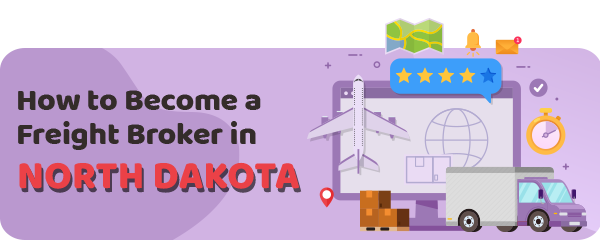You may be at the start of your working career or looking for a change in occupation.
Perhaps the logistics industry has caught your attention and you have come to hear about freight brokers.
The question you are curious about is: What is a freight broker and how do I become one?
If you are a motivated entrepreneur, then this can be an exciting and lucrative career.
Keep in mind, though, that it takes hard work, diligence, and outstanding communication skills to excel.
Article Table of Contents
Freight Broker Duties in North Dakota
Freight services should be in line with both company and government regulations.
Brokers generate sales leads and attract new customers while developing and growing the sales pipeline with each customer.
Brokers should be up to date on the latest market trends in relation to the transportation industry.
This includes any new regulations or laws that have been passed.
- These professionals act as the middleman between shippers, dispatchers, and carriers.
- Freight brokers are expected to align and coordinate the various schedules to ensure that operations run smoothly.
- It is required that freight brokers keep clients up to date on shipments.
- In addition, freight brokers should assist clients with any and all queries that the customer may have.
- Freight brokers plan and coordinate both delivery schedules and pick-up schedules.
- Freight brokers should track the status of each load and keep this information current.
- Records should be kept up to date on all activities.
- This includes freight files and customer receipts.
- A freight broker connects shippers with carriers that are both safe and reliable.
- In addition, freight brokers should build and maintain these relationships with carriers.
- Freight brokers must furnish clients with a shipping quote.
- All paperwork must first be completed and approved.
- Freight brokers book shipments with the carriers and offer assistance to carriers regarding loads.
- Freight brokers must address all issues/problems in a timely and professional manner.
Licensing Requirements to Become a Freight Broker in North Dakota
According to JWSuretyBonds.com, freight brokers are federally regulated by the Federal Motor Carrier Safety Administration (FMCSA).
There are no state regulations but there is a national law that regulates the industry and requires brokers to uphold strict standards.
Brokers must hold a specific license known as a broker authority license or a motor carrier operating authority license in order to practice.
Registration takes 4 to 6 weeks.
Prospective freight brokers need to complete and submit an OP-1 form to FMCSA.
This application includes a $300 filing fee for each application.
When applying online, prospective freight brokers should first obtain a PIN from FMSCA.
This will be delivered in 4 – 7 days to the registered business address.
Once the pin has been received, the online application can proceed.
Brokers should decide to apply for either broker of household goods, broker of property except for household goods, or both.
The next step is to get a broker bond (BMC-84 or BMC-85).
FMCSA requires that individuals get a $75,000 surety bond.
This should be purchased as the license will not be issued without it.
Brokers should carry a surety bond at all times.
The cost is roughly $1 500 per year for BMC-85 and $750 – $9,000 per year for BMC-84.
All brokers should also get liability insurance.
In addition, brokers should select a processing agent.
This includes each state in which the broker writes broker contracts.
Brokers should then obtain a unified carrier registration.
This can be done through FMSCA.
This step is fairly simple and straightforward and the cost involved is $76.
Freight Broker Programs
The minimum requirement is a high school or GED.
Training lasts between 30 and 45 days.
Courses can be completed in class or online.
The cheapest courses start at $200 – $300 with the more expensive courses running at $1 500 and up.
The University of North Dakota offers one of the premium courses.
The course is self-paced with 6 months to complete.
The cost is $1 895 and covers the basics of freight brokering, transportation laws, agreements, contracts, and insurance, as well as documents and software common to the industry.
Salary
According to Salary.com, as of December 27, 2021, the average yearly salary of a freight broker in North Dakota ranged from $29,523 to $33,350.
Keep in mind that various factors will influence this amount, including education, training, experience, etc.
Annual Salary Range:| Location | Avg. Annual Salary |
|---|---|
| Fargo | $49,488 |
| Bismarck | $50,437 |
| Grand Forks | $46,529 |
| Minot | $49,646 |
| Mandan | $50,437 |
| Dickinson | $49,646 |
| Jamestown | $49,171 |
| West Fargo | $49,488 |
| Williston | $49,646 |
| Wahpeton | $48,697 |
Regional Salary in North Dakota
| Region | Employed | Avg. Annual Salary | Avg. Hourly Pay | Top 10% Annual Salary | Bottom 10% Annual Salary |
|---|---|---|---|---|---|
| Fargo, ND-MN | 110 | $52,360 | $25.18 | $68,790 | $38,640 |
* Employment conditions in your area may vary.
Frequently Asked Questions
Do brokers receive a set salary?
Brokers that work for a firm may receive a set salary or a salary with a commission structure.
Independent brokers work solely on commission and can charge, on average, a 15% to 20% brokerage fee.
This amount can go up much higher.
Is formal training required?
No.
The minimum requirement is a high school GED.
But formal training will influence the starting salary.
What are the start-up costs of becoming a freight broker?
Starting your own business as a freight broker can run between $4 000 and $6 000 for smaller-scale businesses and $10 000 and up for larger-scale businesses.
Read the full guide: How to Become a Freight Broker
